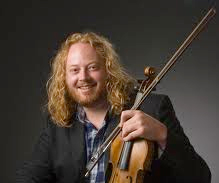by Daniel Hathaway
Carillonneur George Leggiero plays a 12:15 Carillon Recital from the McGaffin Tower in University Circle, and Ohio Light Opera stages two shows: Guys and Dolls at 2 pm & Gilbert & Sullivan’s The Gondoliers at 7:30 (Freedlander Theatre at the College of Wooster).
Tonight, ChamberFest Cleveland presents “Night Moves” with music ranging from Palestrina to Piazzolla (7:30, Disciples Church), Cleveland Lute Fest features Catherine Liddell (7:30, Harkness Chapel at Case), and faculty and students of the Oberlin Baroque Performance Institute form a Baroque orchestra to play works by Lully, Leclair, and Rameau with violin soloist Edwin Huizinga (pictured, 8 pm, in Finney Chapel).
For details, visit the Concert Listings page.
SAVE THE DATES:
On Thursday. June 27, the Oberlin Artist Recital Series announced to friends and subscribers the lineup for its 2024-2025 season. Subscriptions will become available to the general public on July 22, and single tickets will go on sale on August 15.
The six concerts in the series include the Takács Quartet with bandoneón & accordion virtuoso Julien Labro (September 28 at 4:30), Seckou Keita, kora (Saturday, December 7 at 7:30), pianist Emanuel Ax with clarinetist Anthony McGill (Tuesday, February 4 at 7:30), violinist Midori with pianist Özgür Aydin (Wednesday, March 5 at 7:30), Martha Redbone and her Roots Project (Sunday, April 6 at 7:30) & Third Coast Percussion with violinist & composer Jessie Montgomery (Wednesday, April 30 at 7:30).
TODAY’S ALMANAC:
by Jarrett Hoffman
Look past the long series of discarded marriages — more than one ending with a beheading — and you might find interest in the musical side of Henry VIII (born on this date in 1491). BBC Music Magazine explored his impact on the music scene (both harm and help), and his own musical contributions in an article from 2016.
Another historical figure who had a keen interest in music, but who is more famous for his contributions to other disciplines, is Jean-Jacques Rousseau (born today in 1712). That writer and philosopher was also a composer, with seven operas to his name, including the one-act Village Soothsayer. Watch a 38-minute video production dating from 1962, featuring the Orchestre de la Suisse Romande, led by Samuel Baud-Bovy.
Rousseau was also a music theorist, developing a system of musical notation that would be compatible with typography: it would use a single line, with numbers expressing different intervals, and periods and commas indicating rhythm. He presented it to the Academie Des Sciences and was rejected, though they seem to have been impressed, and even requested that he have another go at it.
Moving onto names most famous for their music-making, we continue with Hungarian violinist, composer, and conductor Joseph Joachim, born on this date in 1831. One of the great violinists of the 19th century, he was a close collaborator of Brahms, premiering the composer’s Violin Concerto in 1879 with Brahms himself on the podium. Even much earlier, at age 13, his performance of Beethoven’s Violin Concerto (with Felix Mendelssohn conducting) helped bring that work into greater esteem.
In 1903, Joachim became one of the earliest violinists to be recorded: click here to hear him in a fuzzy but fascinating rendition of Brahms’ Hungarian Dance No. 1.
And finally, composer Richard Rodgers was born on this date in 1902 in New York City. He’s most famous for his work in musical theater, particularly in collaboration with Lorenz Hart and Oscar Hammerstein II — the latter partnership became the most successful in the history of American musical theater.
And though the EGOT was not such a historic concept at the time, Grammy Awards still being in their infancy, Rodgers became the first person to ever receive all four Emmy, Grammy, Oscar, and Tony Awards. (He also received a Pulitzer — only he and Marvin Hamlisch have ever claimed all five awards.)
The Sound of Music — the last musical by Rodgers and Hammerstein together — not only won five Tonys, but its film version won five Oscars. Watch a clip from the movie, where Julie Andrews memorably sings the title track. The show is now in production by Ohio Light Opera with performances through July 26 at the College of Wooster.




